Marketing
Small business marketing: Can email help you survive a recession?
What are small businesses expecting as the world falls into tough economic times? Find out what our survey reveals and get advice for creating a communication strategy that will help keep your business running smoothly – even in a recession.

PUBLISHED ON
During a recession, the little guys often get hit the hardest. As the economy takes a turn for the worse, it impacts different regions, industries, and people in different ways. Small businesses, for example, may struggle to survive a recession more than large organizations.
That’s partly because smaller companies have less of a financial cushion, and cash flow tends to be tight. Small businesses also feel the effects of inflation, rising energy prices, and supply chain disruptions more than bigger companies. When financial challenges arise, small business marketing budgets tend to be one of the first items to get cut.
In our recent report, “Email in an evolving economy”, we surveyed senders of all sizes from around the world. The results show that 15% of businesses with fewer than 10 employees have already cut their marketing budgets and another 13% expect those cuts to come in the next year. This comes as more economists predict the world really is heading for a recession in 2023.
But it’s not all doom and gloom in the forecast. Let’s explore some of the report’s key insights for small business marketers.
Table of contents
Economic factors
Marketing budgets
Email insights
Small business marketing opportunities
1. Boosting brand awareness
2. Improving customer loyalty
3. Automating communications
4. Building your list
5. Personalizing messages
The small business marketing perspective
More than 1,300 people completed our survey during August and September of 2022. That included hundreds of people working for businesses with fewer than 10 employees. This gives us a unique opportunity to look into the small business segment and how it is responding to the expected global recession.
We’ll take a closer look at the following areas and how small business results compare:
Economic factors: What are the biggest concerns for small businesses?
Small business marketing budgets: Will there still be investments in marketing as the economy slows?
Small business marketing channels: What will have the biggest impact and what channels could see cuts?
Email insights: Which sending practices and email marketing tactics are the focus of small businesses?
Opportunities in small business marketing: What’s the silver lining in this cloudy global economy?
Economic factors
No matter who you are or where you live and work, in 2022, there seems to be one issue on the top of everyone’s mind: Inflation. Our report presented participants with 11 economic challenges that could disrupt business in the next year. It didn't matter how we segmented the results, inflation always came out on top.
When asked to select up to three of the biggest economic challenges in the coming year, 58.5% of people working for companies with 10 people or less chose Inflation. Respondents from those businesses also selected Reduced consumer spending 45% of the time, and Energy/transportation costs received 27% of the vote.
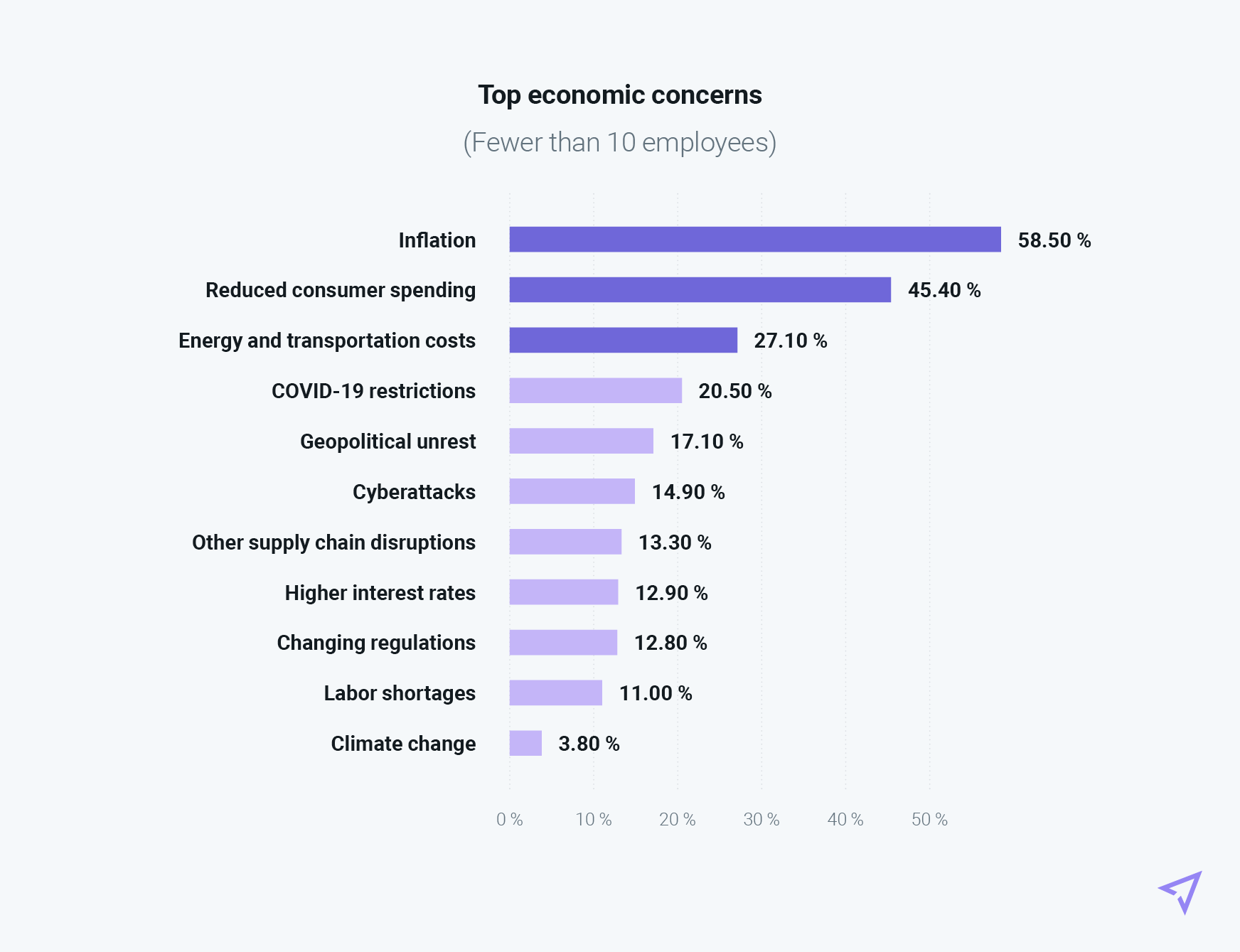
When compared to the overall results, respondents with fewer than 10 employees were slightly more likely than average to select Inflation, but Reduced consumer spending seems to be a much bigger deal to small businesses.
While consumer spending was near the top of the list across the board, results for Reduced consumer spending were at least 10 percentage points higher for the small business segment in comparison to other business sizes.
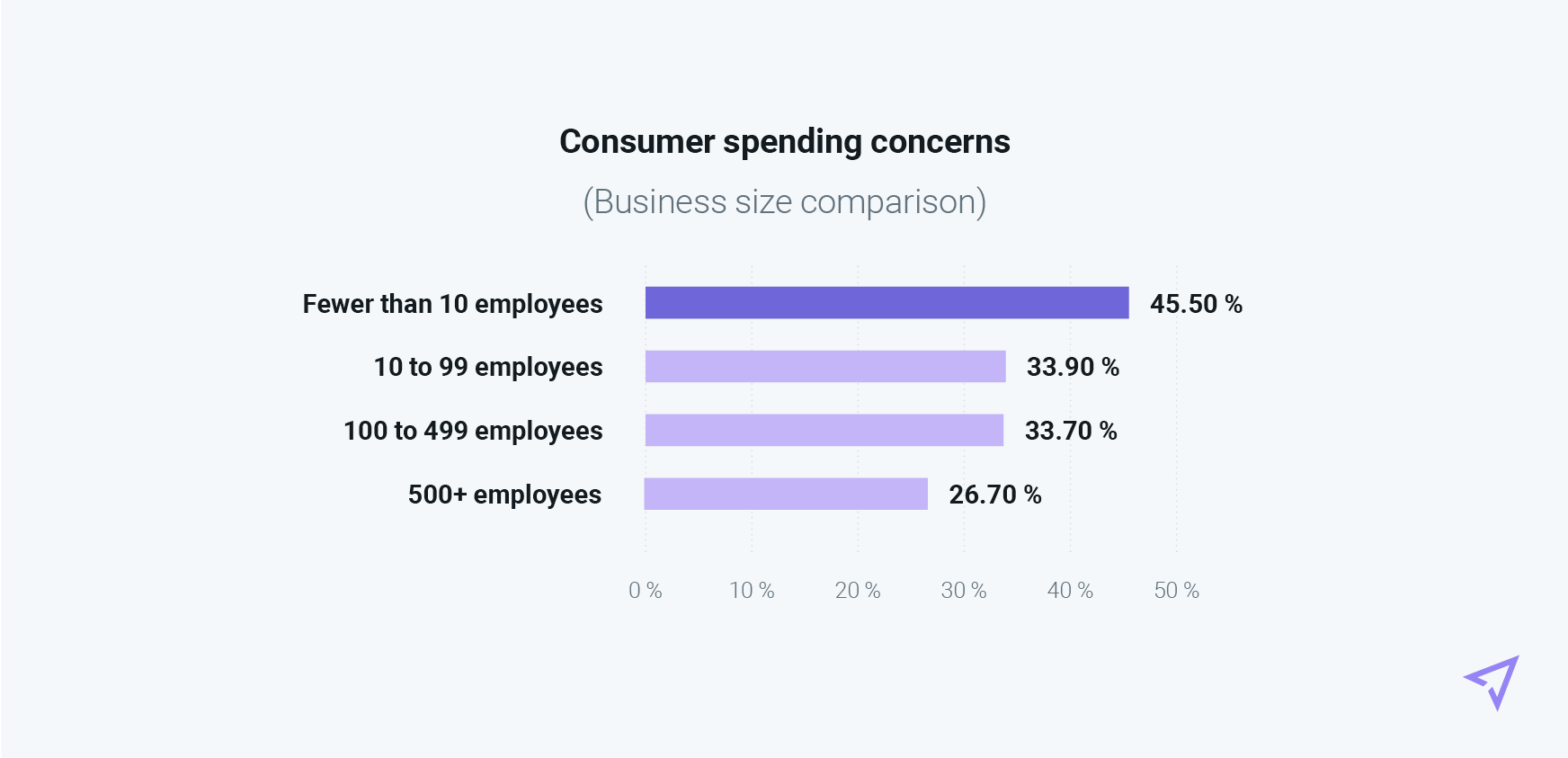
Unfortunately, local small businesses may be one of the first places where consumers cut back on their spending as prices rise and the economy slows. Smaller companies may struggle to absorb rising costs and consumers could look for the least expensive option.
Yet, none of us should forget about the important role small businesses play in our local economies. Not only do they often make our communities better places to live, but the U.S. Small Business Administration (SBA) says these smaller companies make up 44% of the nation’s overall economic activity. People should support small businesses because we need them.
Marketing budgets
So, if consumers stop spending as much, will small business marketing see cutbacks in 2023? We’ve already explained that 28% of the smallest companies in our survey either expect cuts or already reduced their marketing budgets.
However, our survey also found that nearly 20% of small business marketing budgets are expected to increase in the next 12 months. Another 40% of marketing budgets will likely remain unchanged. Uncertainty played a role here as well – 12% of small businesses were still unsure if there would be marketing budget cuts in 2023.
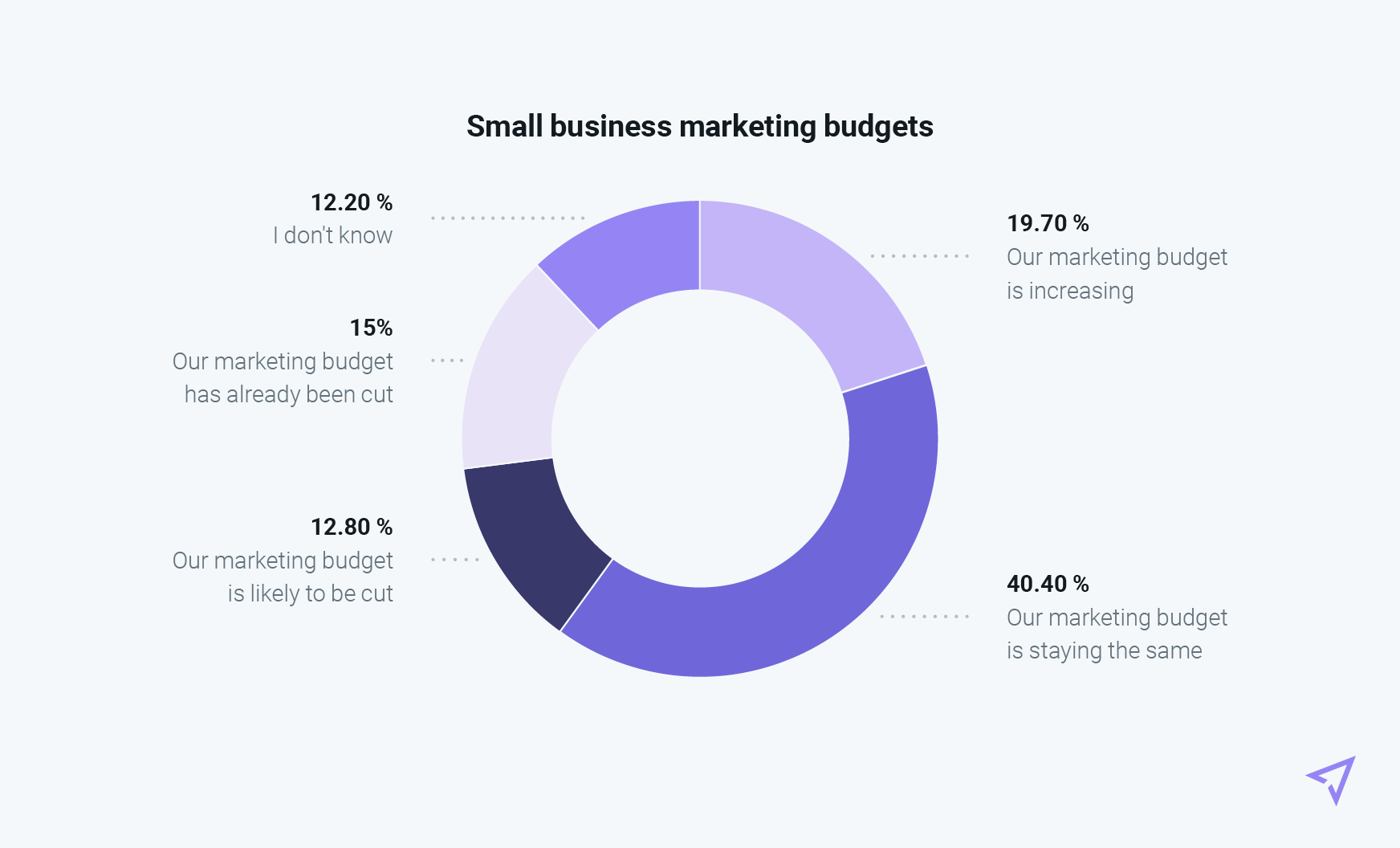
While this certainly suggests some optimism, it’s a little below average for the survey. More than 20% of all other business sizes are expecting marketing budget increases next year. And the small business segment was most likely to describe its digital communication strategy as somewhat or very unsuccessful.
The small businesses that continue investing in marketing can find creative ways to use their budgets to stay top of mind no matter the economic situation. The last thing any business wants is to be forgotten, but that’s a risk you take when you’re not marketing. Instead of stopping all marketing activities, double down on what works.
The good news is that 60% of small business marketing budgets will either increase or stay the same in the coming year.
Email insights
In the full survey, Email marketing barely edged out Digital advertising as the channel most likely to provide a high return on investment (ROI) during a recession. However, for the smallest businesses in our pool of respondents, the email channel slipped to fifth place.
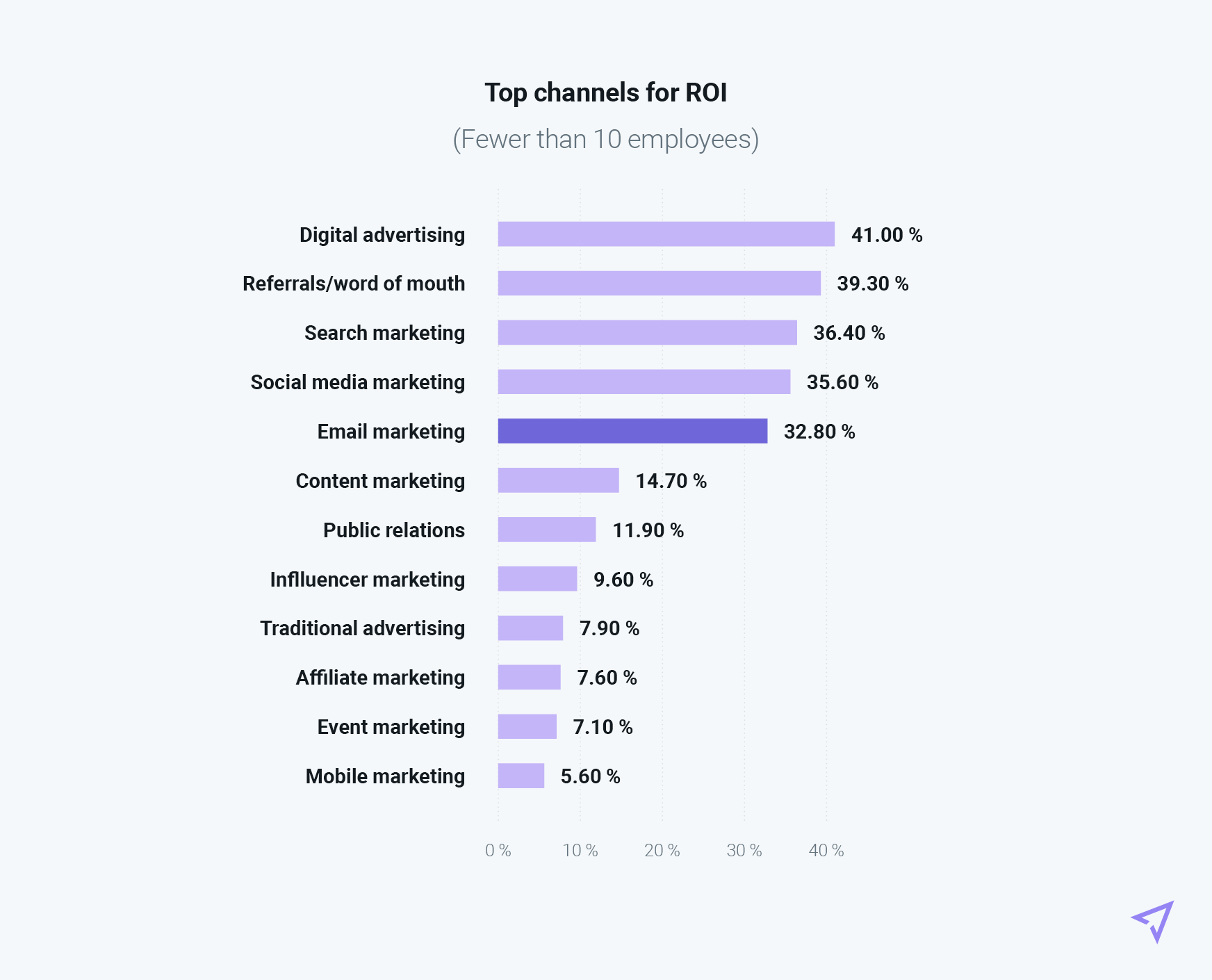
While about 42% of all respondents chose email as a channel that delivers high ROI, just under 33% of businesses with fewer than 10 employees felt the same way.
If you’re not seeing the return you expect from email marketing, maybe it’s time to adjust your strategy. Email can easily be an efficient channel that drives measurable results. But while costs are low, you do need to get creative and strategic with your email program to take full advantage of it.
It doesn’t appear that many small businesses plan to cut back on email. Those working for the smallest companies in our survey are more likely to reduce their investments in digital ads (the top choice) than email. When asked which marketing channels could see cuts in 2023, 29.5% selected Digital advertising but only 13% chose Email marketing.
In fact, when specifically questioned about plans for email in the coming year, a combined 88% of the smallest businesses say they plan to either increase or maintain their investment in email marketing. This suggests that email is working well for the small businesses that are putting email to work.
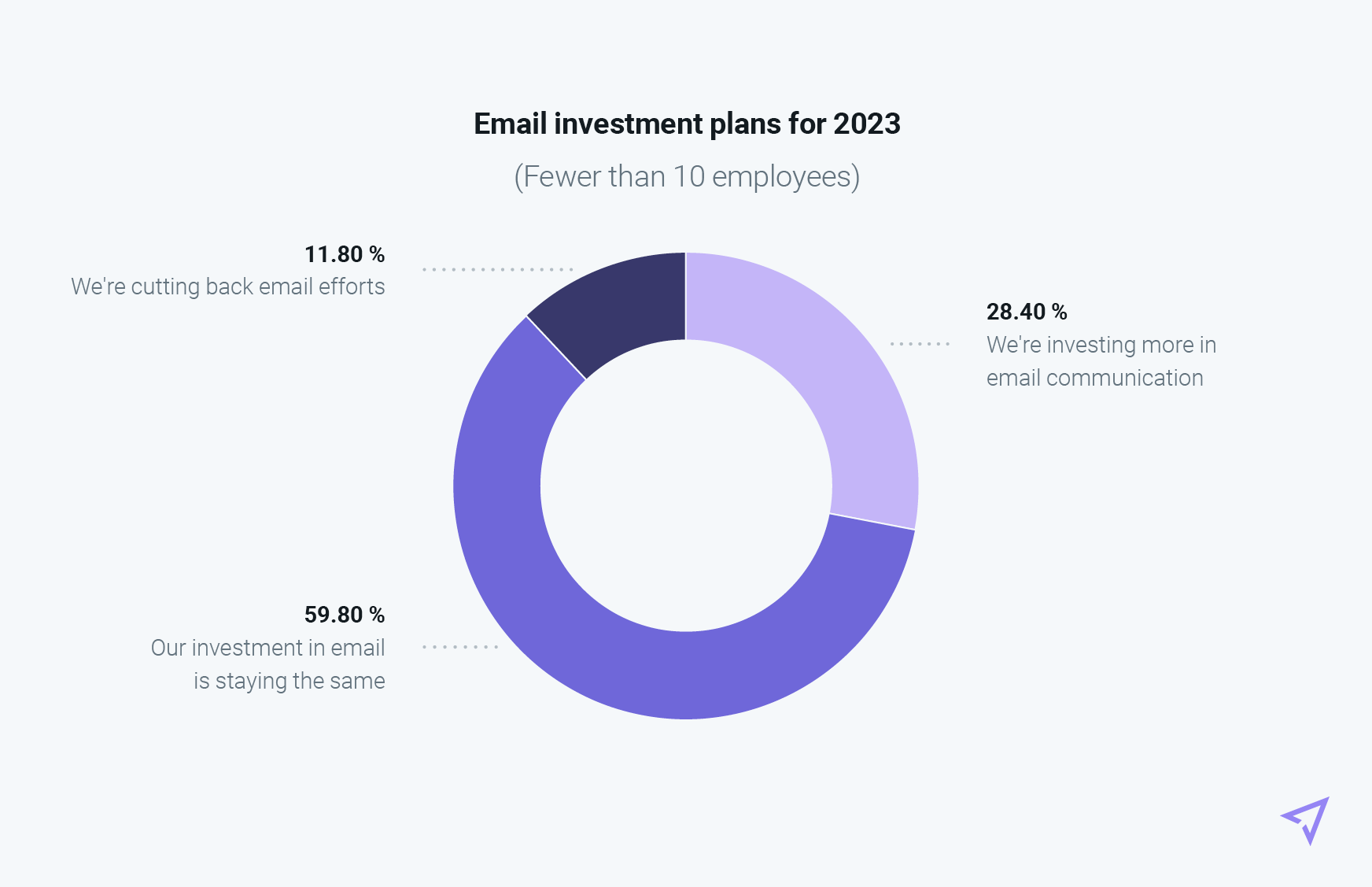
The cohort of smallest businesses identified these email practices as the top three tactics they believe will contribute to success in the coming year:
List building (41.5%)
Personalization (36.5%)
Newsletters and content distribution (31%)
(Respondents selected up to three tactics from a list of 12 options.)
88% of small businesses surveyed plan to either increase or maintain their investments in email marketing next year.
Small business marketing opportunities
We also wanted to know where senders see the possibility for their communication strategy to make a difference during a recession. So, we asked survey participants to identify the top three opportunities in the next 12 months.
When it comes to small business marketing opportunities, responses from those with the fewest employees mirrored the results from all respondents. Small businesses see many of the same opportunities as large ones.
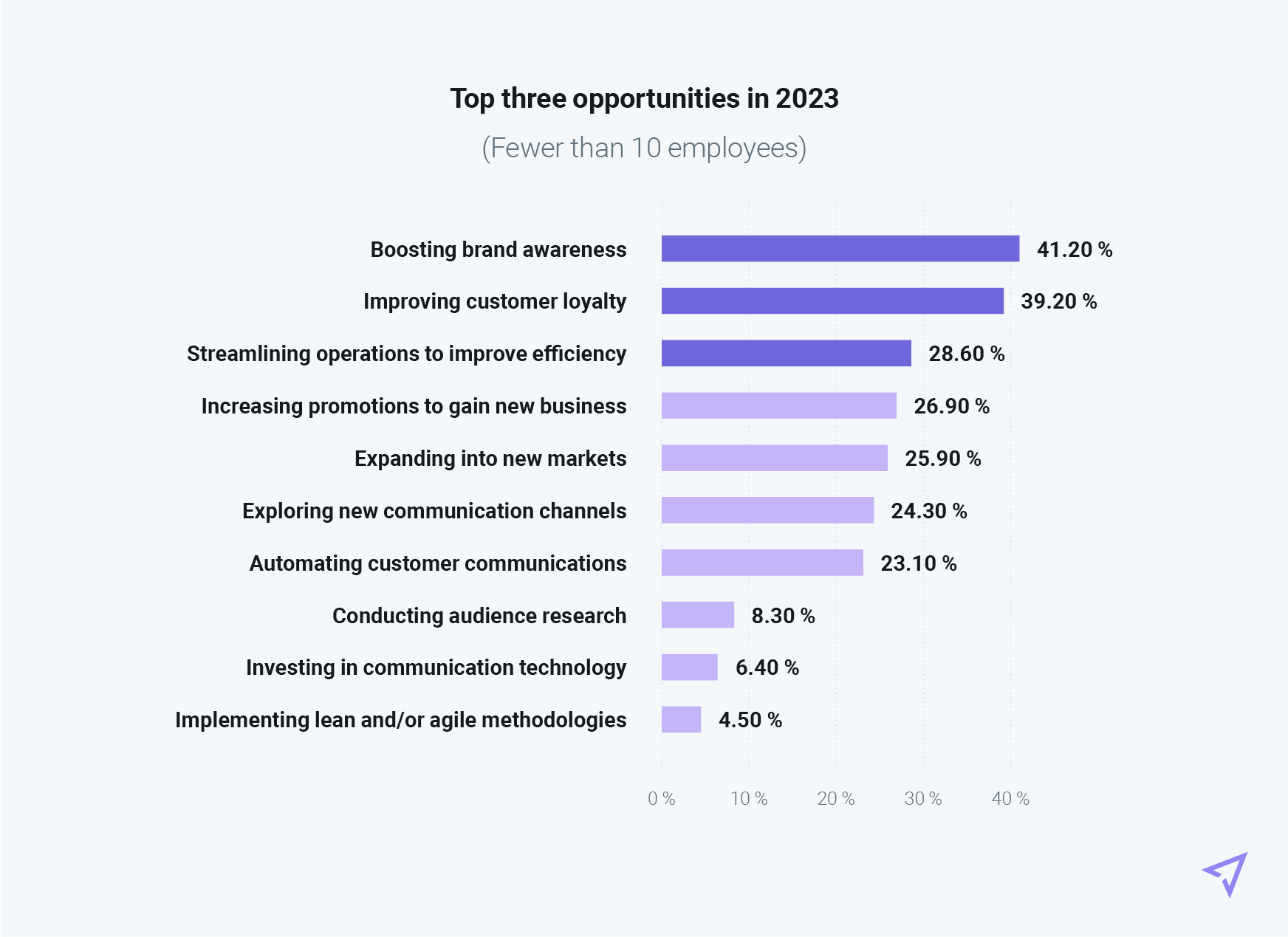
Among the smallest businesses, just over 41% see Boosting brand awareness as an opportunity in the year ahead while they selected Improving customer loyalty 39% of the time. Rounding out the top five was Streamlining operations at 28.5%.
Those with less than 10 employees were least likely to select Investing in new communication technology (6.5%) and Implementing agile/lean methodologies (4.5%) as potential opportunities in 2023.
Honestly, if there is a recession, it may not be the best time for small businesses to try experimenting with new technology or management methodologies. The unsteady economy adds a layer of uncertainty to the results you get from such changes.
Increasing awareness and building loyalty are golden opportunities no matter the economic situation. Brands that achieve both during a recession have a better chance of bouncing back along with the economy as it recovers.
Recession-proof your small business with email
Let’s talk about a different survey for a moment...
Nationwide surveyed U.S. small business owners to get their sentiments on the impact of the slowing economy. The research indicates that 70% of respondents are expecting a recession in the next six months, but only 37% said they feel prepared to handle the situation.
The Nationwide survey also found that:
6 out of 10 respondents say inflation is hurting their business.
4 out of 10 small businesses saw revenue decline in the last six months.
58% of small business owners have explored areas to make cuts.
Let’s be honest, recessions are a bummer – to say the least. But the way small businesses use email to their advantage could help them survive and even thrive during an economic downturn.
Think back to the start of the recession that we all endured in 2020 thanks to the COVID-19 pandemic. Many businesses turned to email to help them communicate with customers. Email was especially important to local small businesses. They used the channel for everything from important safety information and operational changes to encouraging messages and special discounts.
Below are five ways email can help small businesses during the next recession.
1. Boosting brand awareness
While email typically only reaches customers and subscribers who are already aware of who you are and what you do, email marketing is critical to keeping your brand top of mind during a recession.
This is not the time to go silent. While you should probably avoid using the struggling economy as a marketing ploy, you can still deliver helpful, relevant messages to the inbox.
Even if your customers spend less money in the year ahead, you don’t want the competition to steal them away. You want your brand to be the first thing they think of when they’re prepared to make a purchase – even if that happens when the recession is over.
2. Improving customer loyalty
Email is an ideal small business marketing channel for nurturing and rewarding customer loyalty. It can also be used to encourage referrals and word-of-mouth marketing.
The evidence shows it’s a lot easier to convert customers and subscribers than to go out and create new business during a recession. So, use email to keep your base engaged and recommend cross-sells and upsells when it’s appropriate.
Loyal customers are satisfied customers. Get some tips on measuring and improving customer satisfaction.
3. Automating communications
Transactional emails help keep small businesses running smoothly. They include everything from password resets to order confirmations. Transactional communication is also an important part of the customer experience and can encourage both loyalty and awareness.
These types of emails are helpful because they are usually automated, which falls into the category of streamlining operations. For example, an automated welcome series or onboarding emails can let new customers know how things work and what to expect. Find out more about using Mailjet for email automation.
4. Building your list
Small business respondents in our survey saw the most value in list building as an email marketing practice. While it may be tougher to convert new customers when people stop spending, it costs nothing to become an email subscriber.
So, give people a compelling reason to sign up and receive email communications from your brand. That could include quality content in your newsletter, special discounts, expert insights, or cute puppy pics. Whatever works (just try to keep it somewhat relevant).
When you’re ready to start collecting new contacts, you can use Mailjet’s subscription widget to add forms on web pages or as pop-ups.
5. Personalizing messages
As you bring in new subscribers, consider using form fields to collect information about people that will help you create a personalized inbox experience for them. That could include ways to segment them into specific lists, or it could be used for more advanced personalization.
Today’s consumers want and expect personalization from the brands they work with. That’s probably why so many of our survey respondents see email personalization as a practice that contributes to their success. Personalization makes emails feel more, well...personal, which supports customer loyalty. But it also makes the inbox experience more relevant and authentic.
Need some ideas? Check out our article on the power of personalized emails. Want to get started? You can use Mailjet for email personalization right now.
More email marketing advice for small businesses
If you’re ready to use email as a way to recession-proof your small business, we’ve got some excellent articles to help you put together a plan:
Email marketing strategies for small businesses: Get strategic with your sends and check out examples of key email campaigns.
14 ideas to increase your email list: Discover some tips to help you attract and engage the right kinds of subscribers.
All you need to know about transactional emails: Come up with a plan to automate important customer communications with email.
How to plan an effective newsletter strategy: See the seven steps you’ll need to create and deliver a small business newsletter.
While plenty of big brands use Mailjet as their ESP, we are also proud to support many small businesses, entrepreneurs, and freelancers around the world. Find out more about our small business marketing solutions. See for yourself how easy and intuitive it is to use Mailjet for building, sending, and tracking email campaigns. You can get started with Sinch Mailjet for free.








